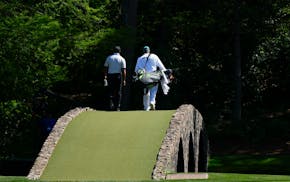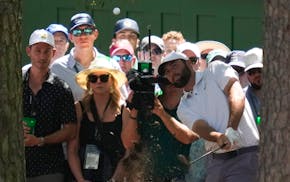HIDALGO, TEXAS - Royce White rides down the glass elevator to the hotel lobby. He's wearing a sleeveless T-shirt that shows off his thick arms and the large "TC" representing the Twin Cities on his left biceps.
He confers with an associate, then pulls up a chair at a table far removed from the noisy bar.
An hour earlier, White's current team, the Rio Grande Valley Vipers, lost to the Texas Legends. White, looking rusty, made one of eight shots and committed five turnovers, although most of them seemed a result of unfamiliarity with his teammates.
Following high school and college basketball careers alternately described as promising and troubled, he has spent much of the past four months in a public dispute with the Houston Rockets over the handling of his anxiety disorder, which manifests itself most noticeably in his fear of flying. Now he is playing for an NBA Developmental League team in Hidalgo, a small Texas border town whose city hall features an elephant-sized killer-bee statue.
As the 16th pick in the NBA draft, White should be staying at the house he purchased in Houston last summer and flying on team charters. By choosing to make himself an example of and a spokesman for people with mental-health problems, he wound up in Hidalgo, flying commercial and coming off the bench.
White believes this is a path well-chosen. He leans forward and eagerly speaks for an hour about mental health, his prospective businesses and his plans to become a philanthropist and politician. He mentions a documentary he's working on, and lists the late Sen. Paul Wellstone and Gandhi as inspirations.
"Every time I go through adversity, not only am I able to reform whatever it is I'm going through by standing for what I believe in, but I also get to reform myself," White said. "Being a humanist and a humanitarian and wanting to do public service, I've learned that every adverse situation you go through helps you see what is necessary."
He says he learned from his troubled time at the University of Minnesota and that he experienced an "awakening" at Iowa State. Long described as "troubled," White hopes he can use his visibility and charisma to improve the quality of American life.
"A lot of what this industry represents takes a lot of joy out of the game for a lot of players," he said. "I try to find the joy in the game that I used to feel. As far as it being a vehicle, my vehicle is being genuine. My vehicle is humanity."
• • •
White's public dispute with the Rockets was hardly his first dose of conflict. He was expelled from DeLaSalle High School for academic misconduct, then transferred to Hopkins, where he won a second state title.
He signed with the Gophers. With them, he was arrested for shoplifting and fifth-degree assault after an altercation with a security guard at the Mall of America. The university police named him a person of interest in the theft of a laptop. White recorded a YouTube video saying he was quitting basketball, and eventually transferred to Iowa State.
"I obviously was involved in the incident at the mall where we were shoplifting," he said. "It was stupid stuff, a bet. If you were watching a movie you would probably laugh at it. That doesn't mean it was OK, doesn't justify it, I don't believe in crime, but it was just petty.
"As far as what happened with the laptop, you're talking about something I had nothing to do with."
White said that at Minnesota, he had an entourage of friends from his neighborhood.
"I would never forsake them," he said. "A lot of it was believing that them being around me was safer than spending time where they came from. I've had a lot of black friends die. Killed. Shot. That was the reality of where they live. The message I kept hearing was, 'Don't blow your opportunity because of these people.' It was almost as if, because I had a scholarship, my life meant more than theirs. I didn't stand for that then, and I don't stand for it now."
White lauded Gophers coach Tubby Smith and his son Saul, an assistant coach, saying: "Tubby Smith is a great coach. I love him to death to this day, and his wife is incredible. Saul and all the coaches were incredible. They did what they needed to do for themselves. I understand how Coach Smith couldn't risk his job for me, nor could the athletic director or president. But the reality is that a lot of things that happened there weren't right."
• • •
At Iowa State, White blossomed athletically and intellectually. Forced to fly regularly by the Cyclones' schedule, he became aware of his anxiety disorder and began studying mental-health issues, as well as philosophy and sociology. Everything that had happened in his life informed his viewpoint.
He lived with his mother, Rebecca, growing up. When he was 12, upset by his mother's relationship with a man he "didn't feel comfortable with," he moved in with his grandfather, Frank.
As he contemplated his own anxiety disorder in Ames, he began to see mental-health problems as an American epidemic.
He rattles off mental-health statistics the way baseball fans rattle off batting records. He says "26.2 percent of Americans have a diagnosable mental-health issue in a given year," and "one in three people with mental-health disorders won't be diagnosed. That means that 50 percent of Americans, and probably more, have dealt with mental-health issues."
White cites Twitter and other social media "as the best census we could have," and notes that many people use social media to attack people they don't know, including him.
"These are people who are among us," he said. "I've had people tweet me heinous stuff, and then I see on their profile that they're a 'counselor.' These are people who run our schools and work with kids. We want to focus on the guy who might walk into this hotel lobby and shoot everybody, instead of the millions of young black men who will kill each other in our communities."
Dr. Matt Kushner, Ph.D., is a clinical psychologist at the University of Minnesota. He said: "It sounds to me like he's in the right ballpark, statistically. It all depends on what you call 'mental disorders.'
"I'm not a reader of the sports page, but I love his story. I think that these high-profile people really do a great service to society when they raise awareness of problems like this."
White is planning a nationwide bus tour to promote awareness of disorders. He probably never will receive more attention than he has through basketball, whether it was becoming a national story when Frank drove him to NCAA tournament games or whether it was his public debate with the Rockets.
"I can fly," he said. "I always could fly. But flying affects me in a negative way. There is a cost."
He said he is happy with what became a contentious public negotiation process with the Rockets, although he still insists every player should be represented by an independent doctor.
"We've forced each other's hands," he said. "It wasn't willing. It wasn't voluntary. Sometimes that's what's needed. I think as I was able to progress the league in terms of putting them on notice of mental health, I still feel like they were just forced to do this and the attention that needs to be paid really isn't there, even still.
"It isn't their fault. It's a societal thing. It's our country. Our government is to blame. The government should impose mental health as an emphasis. And if they don't, why would businesses make it an emphasis? If the government didn't tell you you had to have exit signs on the building, you wouldn't."
He said one of his "biggest qualms with humanity right now" is "we rationalize things that we know are wrong so that we don't have to work to change them. I don't stand for that. I stand for reform, progress and human welfare."
White says he has assembled a "team" of associates who will help oversee his endeavors. His plans sound expensive.
His rookie contract will pay him $3.4 million per year for three years. To encourage an NBA team to sign him to a second contract, he'll have to prove he can function as a player.
• • •
White is averaging 4.6 points, 4.8 rebounds, 3.6 assists and 2.6 turnovers in five games, averaging 18.4 minutes a game. Last weekend in Hidalgo, he played two games against the Texas Legends, coming off the bench in both.
He is a deft and intelligent passer and a powerful defender, but he isn't in top shape and struggled with his outside shooting even during warmups.
On Feb. 22, he was given a technical foul for arguing. The next night, he and an opponent were ejected after a confrontation.
"Royce has to realize that this is a business," said Doug West, the former Timberwolves star who's an assistant coach for the Vipers. "Whether in the D League or up above, these guys are in it to win, to get paid and to make a living. You have to take the game serious. You have to put the time in.
"He's had a lot of stuff going on with him for the last four months. Now he's playing, but he needs to take the next step. He's the 16th pick in the draft and at some point you have to play to that level. He has to get himself into shape."
Rebecca said basketball has "always been an appropriate priority for Royce. I don't think it's any different today than it ever has been. I do feel like he's in a good place. I really look forward to him, from a health standpoint, being back playing and being able to get that peace from what he loves to do."
Frank, his grandfather, plans to travel to see Royce play soon.
"I am so proud of my grandson for standing up for what he believes in," he said. "He literally has said, 'I may never play in the NBA.' Take a kid who grew up with his background, and consider what a guaranteed contract in the NBA means to him, and he was willing to give that up to stand up for his rights?
"Now, I think he's becoming a little more grounded and may be slowing down on some of those business things he's been talking about, as he focuses more on basketball. First and foremost, he's got to create a presence and show his talents and be a basketball player. And I think in sincerity Royce will end up doing some things that will help people with mental-health challenges."
It's getting late on a Friday in McAllen, and White is still happily discussing his beliefs. He admits he might not be able to singlehandedly improve the state of mental-health care in the United States, might not even be able to "reform" the way the NBA operates.
"Gandhi said that no one can know what will result from your actions, but if you take no action, you will get no results," White said. "Will we fall short of our goals? Probably. But I believe in taking action."

Souhan: Why Tiger Woods should keep swinging
Souhan: Scheffler wins Masters again, shows what makes him special
Morikawa falters in final round at Masters

Keeping up with the Joneses who helped design Augusta National's classic back nine

